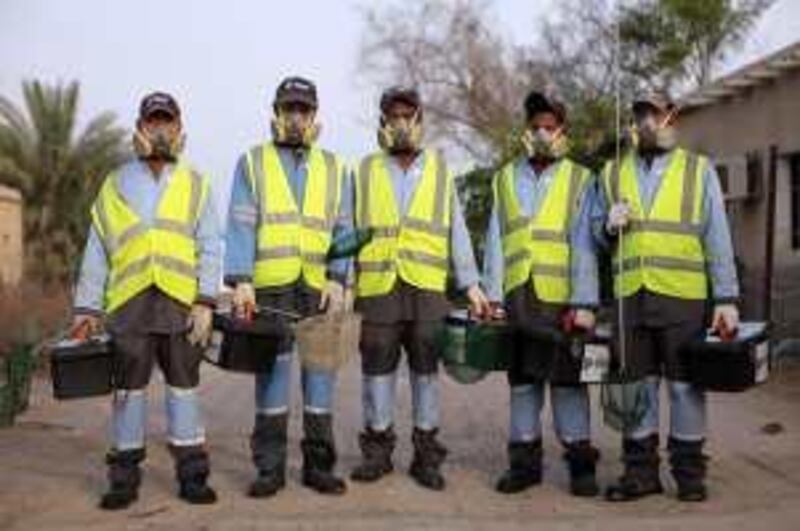ABU DHABI // Out in rural Abu Dhabi, there is a war going on. Without warning, teams of masked men descend on farms and other areas, armed to the teeth. Their enemy is an army of bugs and the deadly disease it spreads. They are the mosquito patrols. Weekly, in some cases daily, the pest controllers visit some of the 1,300 farms in the rural parts of the emirate.
They scoop up small samples of any stagnant water and examine it closely for mosquito larvae - especially those of the anopheles mosquito, the species that carries malaria. So far, Health Authority-Abu Dhabi (HAAD) is winning the war. The last case of the disease that was shown to have been transmitted by a UAE mosquito was in 1997. Even so, the number of imported cases has steadily increased. Dr Ahmed Abdalla, the head of the Malaria Programme and a senior officer in the communicable disease section at HAAD, is the man in charge of ensuring that the emirate keeps malaria at bay.
"We usually get between two to five per cent positive results for breeding mosquitoes at all the sites we have," he said. "We are looking to bring this down below two per cent. "It's almost impossible to say how many breeding sites there are. We are concentrating on the areas where there is a high risk of transmission." Those risky areas are the places where the anopheles mosquito lives in close proximity to people who may already have the disease, especially those from countries where the illness is endemic, such as India and Pakistan.
Many farm workers, said Dr Abdalla, spent time in areas of their home countries where they would be at high risk of picking up malaria. That risk is so great that these men undergo blood tests whenever they return from their home countries. The testing was voluntary and, so far, all had co-operated, Dr Abdalla said. Still, though, increased awareness was necessary, he said. "There are some obstacles but we are trying to overcome them. It's not an easy job to monitor all the farms but it's an essential one.
"When we get resistance we try to explain to them the reasons. It is important they understand why it is so serious." One of the problems faced by the programme is the proximity of the breeding sites to residential areas. There are houses just "over the road" from many farms, according to Moawia Osman, the operations manager of Eagle, the pest control firm working with HAAD. "We really need public awareness," he said. "We are not allowed to go into the homes but the houses are in flying distance of the breeding sites on the farms. "This means the mosquitoes could create breeding sites in the homes and we cannot check."
Mosquitoes need only a very small surface area of standing water to lay their eggs, he said. Even a soft drink can containing water could become infected. The malaria programme has three main types of weapons - mechanical, chemical and biological. Farm owners are encouraged to install machinery to disturb stagnant water. Spraying the water with temephos also kills the larvae and, according to Mr Osman, is not harmful to people or crops if used correctly.
Some farm owners have chosen to cover their water reserves with a fine mesh, preventing the mosquitoes from reaching the water's surface. Larva-eating fish can also be introduced into larger bodies of water. This, however, is not always successful, according to Dr Abdalla, because some farms do not install the right equipment to keep them alive. "If the farms don't put nets over the filters which carry the water from the tanks ? the fish get sucked up and killed," he said. "But it is very good when it is done properly. The fish can breed and then be collected and moved to another tank."
As well as rural areas, cities can also become ideal breeding grounds for the insects. Water sitting on roofs or on streets for long periods are perfect for mosquitoes to lay their eggs. But the amount was minimal compared with the rural areas, Dr Abdalla said, so the spraying teams spent most of their time on the farms. According to the Ministry of Health, the number of cases of malaria across the UAE rose from 1,322 in 2001 to 2,696 in 2008. All of these were imported.
Figures from HAAD showed that the number in Abu Dhabi more than doubled from 571 in 2005 to 1,393 in 2009. Experts said increases in global travel and a migrant population from high-risk areas was the cause. "We need to stay vigilant at all times," Dr Abdalla said. "It is not easy, but if we take all the right measures it is possible." munderwood@thenational.ae





